Other people’s festivals and holidays are enthralling. I have found it a very special privilege to be in Jerusalem on the Sabbath, or in Cairo on a Friday morning. Simply to feel the common agreement to behave differently on this day is a key to a world I do not know. In both cases, the comfortable, relaxed, utter silence beating against your bedroom window is powerful enough to waken the traveler early from sleep. It also evokes, in an Englishman of my age, buried memories of my own country when it took more account of such things, the wet black skies of Protestant Sundays, severe and restrained, silence broken only by church bells. Then there are the giant events, such as Revolution Day in the Soviet Union, a vast ceremony in praise of the tank, the intercontinental ballistic missile, and, of course, that fiend out of hell, Vladimir Ilyich Lenin. I saw the last of these in November 1990, freezing under my fur hat on Red Square in Moscow, and having no idea that there would never be any more.
“Thanksgiving has always been my idea of what a national public holiday should be.”
But one such festival beats all the others. The American feast of Thanksgiving has always been my idea of what a national public holiday should be. In an increasingly secular society, it is insistently religious. If there is no God, to whom are they giving thanks? Like all good rituals, it is built around family, food, and drink. It is sharpened by the approach of winter, the brisker air and briefer daylight making festive gatherings far more alluring. (One reason why I have always rejected the—often appealing—idea of going to live in the Southern Hemisphere is the horrible thought of a midsummer Christmas.) It is cleverly set on a Thursday, so creating a four-day weekend during which everyone can sleep or work off his excess. And beyond it lies Christmas, so that there is no bleak thought, as there can be on Dec. 26, that months of dreary winter lie ahead, with no light shining in the distance. Our own British bank holidays, as we oddly call them, are almost all on Mondays, a miserable day for a feast, a lifeless government-ordained day of rest fit for little except the nursing of hangovers. I generally go to work on these occasions, which is often more relaxing than hanging about at home waiting for them to end.
We spent two Thanksgivings in the United States. Once, invited by friends up to Ithaca near New York’s lovely Finger Lakes, we drove long miles up from Washington through the hills of Pennsylvania on a dark, chilly day. It was a sort of American hajj, except that everyone was scattering in different directions for the same purpose, rather than heading for one place of pilgrimage. Countless others were on the move on similar missions. I think we saw license plates from more than 40 states. The next year, we held our own Thanksgiving meal (lighter on the uneatable pumpkin than tradition dictates) at our small house on a very friendly street in Bethesda, Md., and had the same encompassing feeling of being surrounded, for hundreds of miles in all directions, by others happily sharing one common experience. We had always flown the British Union Jack from the front porch—my landlord and my neighbors said we could fly anything we liked there, as long as it wasn’t the Confederate flag—and it didn’t seem at all out of place on that day or any other. Thanksgiving had originated with our English forebears, after all.
Since then, I have often thought that Britain, even now having much to be thankful for, might do well to copy America. Our major festivals have lost their savor as Christianity has faded from our lives. Why not an annual Thanksgiving on the Thursday nearest to Winston Churchill’s birthday (Nov. 30). It could be proclaimed annually from Windsor Castle by His Majesty the King, and the remaining Christians could use it as an occasion to recite the majestic General Thanksgiving: “We thine unworthy servants do give thee most humble and hearty thanks for all thy goodness and loving kindness to us and to all men…” But no pumpkins, please.
